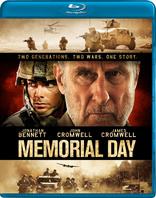Memorial Day Blu-ray Movie
HomeMemorial Day Blu-ray Movie 
Image Entertainment | 2011 | 108 min | Not rated | May 29, 2012Movie rating
6.4 | / 10 |
Blu-ray rating
| Users | 0.0 | |
| Reviewer | 3.0 | |
| Overall | 3.0 |
Overview
Memorial Day (2011)
Memorial Day, 1993. When 13-year-old Kyle Vogel discovers the World War II footlocker belonging to his grandfather, Bud, everyone tells Kyle to put it back. Luckily, he ignores them. Although Bud has never talked about the war, he finds himself striking a deal with his grandson: Kyle can pick any three souvenirs, and Bud will tell him the stories behind each one. Memorial Day not only takes us on a journey into Bud's complicated wartime past, but also into Kyle's wartime future. As the two men share parallel experiences in combat, they come to realize how that magical day on the porch shaped both of their lives.
Starring: Jonathan Bennett, James Cromwell, John Cromwell (II), Jackson BondDirector: Sam Fischer
| War | Uncertain |
| Action | Uncertain |
| History | Uncertain |
| Drama | Uncertain |
| Family | Uncertain |
Specifications
Video
Video codec: VC-1
Video resolution: 1080p
Aspect ratio: 1.78:1
Original aspect ratio: 1.85:1
Audio
English: DTS-HD Master Audio 5.1
English: Dolby Digital 5.1 (448 kbps)
Subtitles
English SDH, Spanish
Discs
25GB Blu-ray Disc
Single disc (1 BD)
Playback
Region A (C untested)
Review
Rating summary
| Movie | 2.5 | |
| Video | 4.5 | |
| Audio | 4.5 | |
| Extras | 1.5 | |
| Overall | 3.0 |
Memorial Day Blu-ray Movie Review
War and Remembrance. And Some Other Stuff.
Reviewed by Michael Reuben May 26, 2012So much noble intention obviously underlies Memorial Day that it seems almost churlish not to respond with the strong sentiment for which the film seems to beg. But as I watched this independent production, a direct-to-video release by Image Entertainment after limited festival play, what I most felt was confusion. Was it about patriotism? Male bonding? Post-traumatic stress disorder? A general statement that war is hell? Such effort has been invested into drawing parallels between a grandfather fighting the Nazis in Europe in the 1940s and his grandson fighting insurgents in Iraq in 2005 that, at times, the film seems to be looking for some sort of grand continuity uniting these two conflicts. If that's the case—and I'm reluctant to say it is, because the film ends too evasively to know what the whole experience is intended to convey—it would be a textbook example of false equivalence. Director Samuel Fischer and writer Marc Conklin began with a promising idea, which is summed up in the question posed by thirteen-year-old Kyle Vogel to his grandfather: "It's Memorial Day. What am I supposed to remember?" That simple query opens up vast, rich fields to be mined: of an old man's coming to terms with events long past but still vividly remembered; of a young boy's coming of age through the profound experience of suddenly being seen as worthy—as man enough—to be taken into his grandfather's confidence; of a family bond being forged across generations. Apparently, though, Fischer and Conklin didn't believe this was enough for one film, and they decided to make all of it a flashback (or, technically, a flashback-within-a-flashback) that is supposed to illuminate the psychology of a contemporary soldier in a war that is still fresh in the viewer's memory. Aside from dragging in much extraneous context (and subtext), that narrative choice makes a confusing mess out of what might have been a moving meditation on war and remembrance (to borrow the title of Herman Wouk's great World War II novel).

Memorial Day alternates among three time periods. In the middle (and by the far the most affecting) time period, young Kyle Vogel (Jackson Bond) finds the World War II footlocker of his grandfather, Bud (James Cromwell), while playing hide-and-seek with his two younger siblings and a neighbor's kid on a visit to the grandparents' Minnesota farm on an idyllic Memorial Day in 1993. Everyone, including Kyle's grandmother, Betty (Mary Kay Fortier-Spalding), tells Kyle not to ask Bud about the footlocker, but Kyle senses its importance and perseveres. It's a box of war souvenirs, and Kyle and his grandfather strike a deal: Kyle can pick any three items, and Bud will tell him the story behind each one. After listening to the first two stories, Kyle's eye is drawn unerringly to the item that will unlock the story Bud most needs to tell. The second time period in the film is the 1940s, when Bud (now played by John Cromwell, son of James) was an army lieutenant in the European campaign. He'd survived the invasion of Normandy, but there was still plenty to come: impossible decisions, injuries, close calls with death, losses of friends—and worse. Bud has been holding onto these experiences for fifty years, and one of the clear messages of the film is that such stories need to be told, for the sake of both the listeners and the speaker. Bud almost waited too long. By the time his grandson confronts him on Memorial Day 1993, he's beginning to lose his memory to Alzheimer's. The third time period is where the film's problems arise. In 2005, Kyle (now played by Jonathan Bennett) is an army sergeant deployed to Iraq. Like his grandfather before him, he too collects souvenirs of important moments good and bad (mostly bad). Also like his grandfather, he is wounded, but not severely; loses comrades; and has to make life-and-death decisions. And yet, despite the example that Bud has provided for him of the price that one pays for bottling up all the emotions that accompany these experiences, Kyle does exactly what his grandfather did. He's locked himself up so tightly that he suffers from crippling migraines. All of this emerges when Kyle is recuperating in a military hospital from injuries suffered from an IED ("improvised explosive device"). A nurse named Lt. Tripp (Emily Fradenburgh) tells him that his headaches are a sign of tension and keeps after him to talk about himself. She finally breaks through Kyle's defenses just before he's discharged and he knows he won't have to see her again (he as much as says so before leaving). What Kyle relates to the lieutenant becomes the narrative of the film. What are we supposed to make of Kyle's headaches? Bud suffered from no such disability in combat. Are they intended as some sort of "accelerated" version of the years—indeed, decades—of emotional remoteness that Bud inflicted on his family because of his inability to recover from the psychic injury of the war years? (His wife compares his Memorial Day talk with Kyle to tearing the bandage off an old injury, but fifty years is a long time to leave a bandage in place.) It's not as if the headaches are a minor issue in the story. Fischer and Conklin dwell on them at length. They're even responsible for another soldier dying in Kyle's place (because Kyle is incapacitated at a key moment and someone else has to step in for him). The conclusion of the film is equally unsatisfying, as Kyle returns home to his own wife and young son, Zachary, who asks his father about a war souvenir and is told to wait until he's older. Asked by his wife when he plans to tell Zachary about his war experiences, Kyle replies: "When he makes me." It's a clever answer, but it's also an evasion—and, one suspects, the first of many. Has Kyle learned nothing from his grandfather's experience? Or is the lesson that it's a test of manhood whether one has the courage to ask the question, and Kyle's own father (whom we see briefly in 1993) failed the test, thereby leaving to Kyle the burden of easing his grandfather's pain? (No pressure now, Zachary.)
Memorial Day Blu-ray Movie, Video Quality 
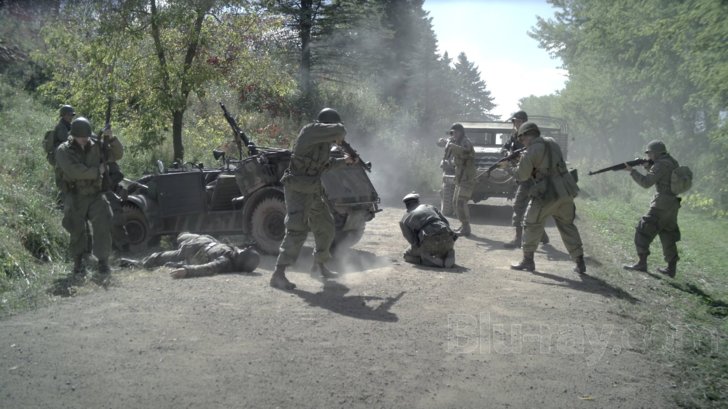
Memorial Day was photographed with the Red One digital system by cinematographer Bo Hakala, and the video quality on Image Entertainment's 1080p, VC-1-encoded Blu-ray is yet another demonstration of the exceptional quality of which Red One productions are capable. The image is rich, detailed and noiseless throughout, and the superior depth of field that is typical of Red One photography is especially noticeable here and effective in establishing context for Fischer's shot composition. Precise color correction in post-production has helped the imaginative production design get away with simulating both 1940s Europe and 2005 Iraq in Minnesota locations; the color schemes and contrast levels are so strikingly different between these two time periods (and also between them and the 1993 Minnesota farm scenes) that you barely need intertitles to tell them apart.
Memorial Day Blu-ray Movie, Audio Quality 
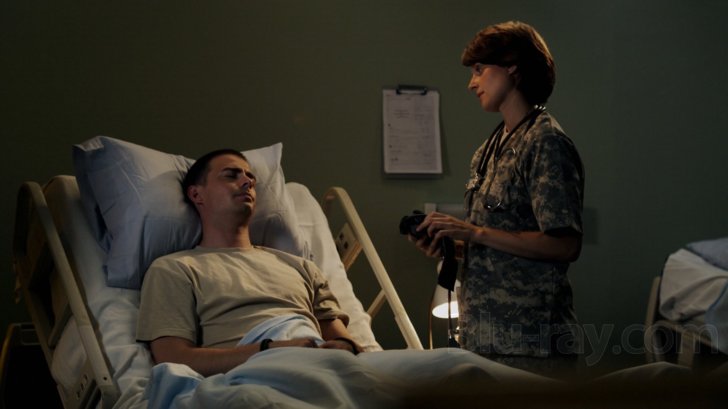
The DTS-HD MA 5.1 track has been carefully mixed to use the rear channels effectively in both louder and quieter moments. For example, in 1993 Minnesota, the sounds of wind, birds and insects can be heard faintly in the distance; in 2005 Iraq, when Lt. Kyle Vogel is recovering in the hospital, an occasional military transport rumbles through the distance. In battle, however, bullets whiz by, bombs explode with a palpable boom and, in one instance, an Iraqi insurgent's IED detonates, throwing shrapnel in all directions. The DTS lossless track reproduces all these effects with punch and power. In what may be a growing trend in film soundtrack mixing, the intense score by Paul Hartwig has been placed further to the back and relies more heavily on the rear speakers than has been common until now. This can occasionally render the dialogue a little difficult to understand, especially from James Cromwell, who often drops his voice. But there are always the subtitles. (Note: A DD 5.1 track, at 448 kbps, is also included.)
Memorial Day Blu-ray Movie, Special Features and Extras 
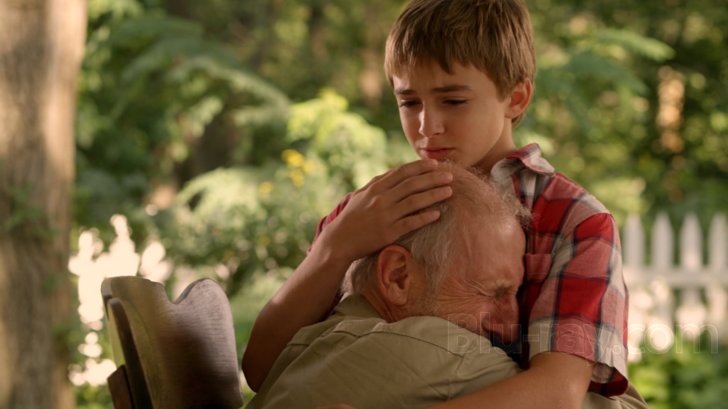
- Commentary with Director Sam Fischer, Writer Marc Conklin and Actor John Cromwell: As commentaries go, this one is understated. Pauses are frequent, and much of the discussion involves identifying locations, acknowledging people who worked on the film and contributors of historically accurate props, uniforms and equipment (including planes). There is no discussion of the project's origins and relatively little of its major themes and plot elements. (For example, when Conklin is specifically asked to talk about Kyle's migraines, he quickly ducks the question.)
- Behind the Scenes (HD, 1080p; 1.78:1 ;1:54): In a bizarre approach, behind-the- scenes clips have been sped up and edited together at a breakneck, ADD-paced speed without comment or explanation. I don't know why anyone thought this would be interesting or informative.
- Additional Trailer: At startup, the disc plays the trailer for The Double, which can be skipped with the chapter forward button and is not otherwise available once the disc loads.
Memorial Day Blu-ray Movie, Overall Score and Recommendation 
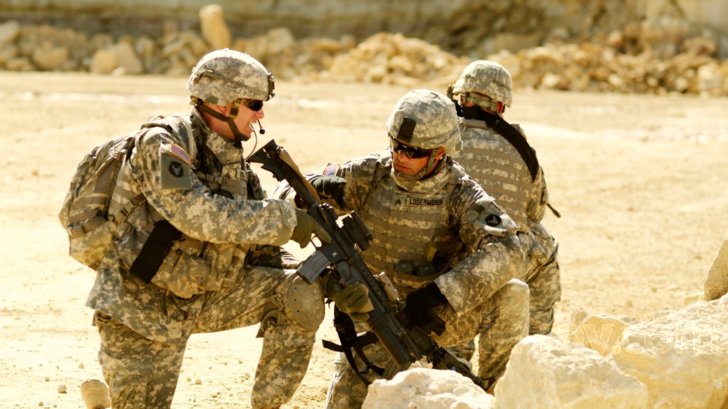
Throughout Memorial Day, I kept wondering why Fischer and Conklin didn't base their story on a Vietnam veteran (perhaps an uncle instead of a grandfather), whose experiences might have been more readily analogized to those of a soldier in Iraq and who would have struggled under the additional burden of receiving a muted reception, at best, upon his return home. A clue arrived when I listened to the commentary, where Fischer joked about getting Conklin to finish the script by locking him in a closet and feeding him a diet of "World War II movies and bread under the door". War movies? Why not memoirs and novels? Those would be better sources for the interior life of a soldier. But if Conklin and Fischer really did rely on films for inspiration, it's obvious why they couldn't use Vietnam. The great films inspired by that war—Apocalypse Now, Platoon, Casualties of War—are not the sort to instill reverence for military service suitable for Memorial Day. No, they had no choice but to resort to the Greatest Generation's efforts in World War II, the "good" war whose Manichean clarity America has been trying to replicate in every conflict, hot or cold, in the seven decades since. Whether or not Sergeant Kyle's migraines are an apt symbol for the results is something I'll let the individual viewer decide. Memorial Day features wonderful work by James Cromwell, whose scenes with young Jackson Bond are genuinely affecting; but these remain isolated vignettes within a film that doesn't add up. Maybe it's time for filmmakers to move on from World War II. It has become, to paraphrase Dr. Johnson, the last refuge of the nostalgic.
Similar titles
Similar titles you might also like

Battle of Britain
1969

Battle of the Bulge
1965

A Bridge Too Far
1977

The Dam Busters
1955

Anzio
1968

Into the White
2012

The Longest Day
1962

Flags of Our Fathers
2-Disc Special Edition
2006

Glory 4K
1989

Red Tails
2012

Black Hawk Down 4K
2001

The Patriot
Extended Cut
2000

The Outpost 4K
Extended Director's Cut
2020

Enemy at the Gates
2001

We Were Soldiers 4K
2002

Midway
2019

Gods and Generals
Extended Director's Cut
2003

9th Company
9 rota | Collector's Edition
2005

The Siege of Firebase Gloria
1989

The Great Raid
Unrated Director's Cut
2005
